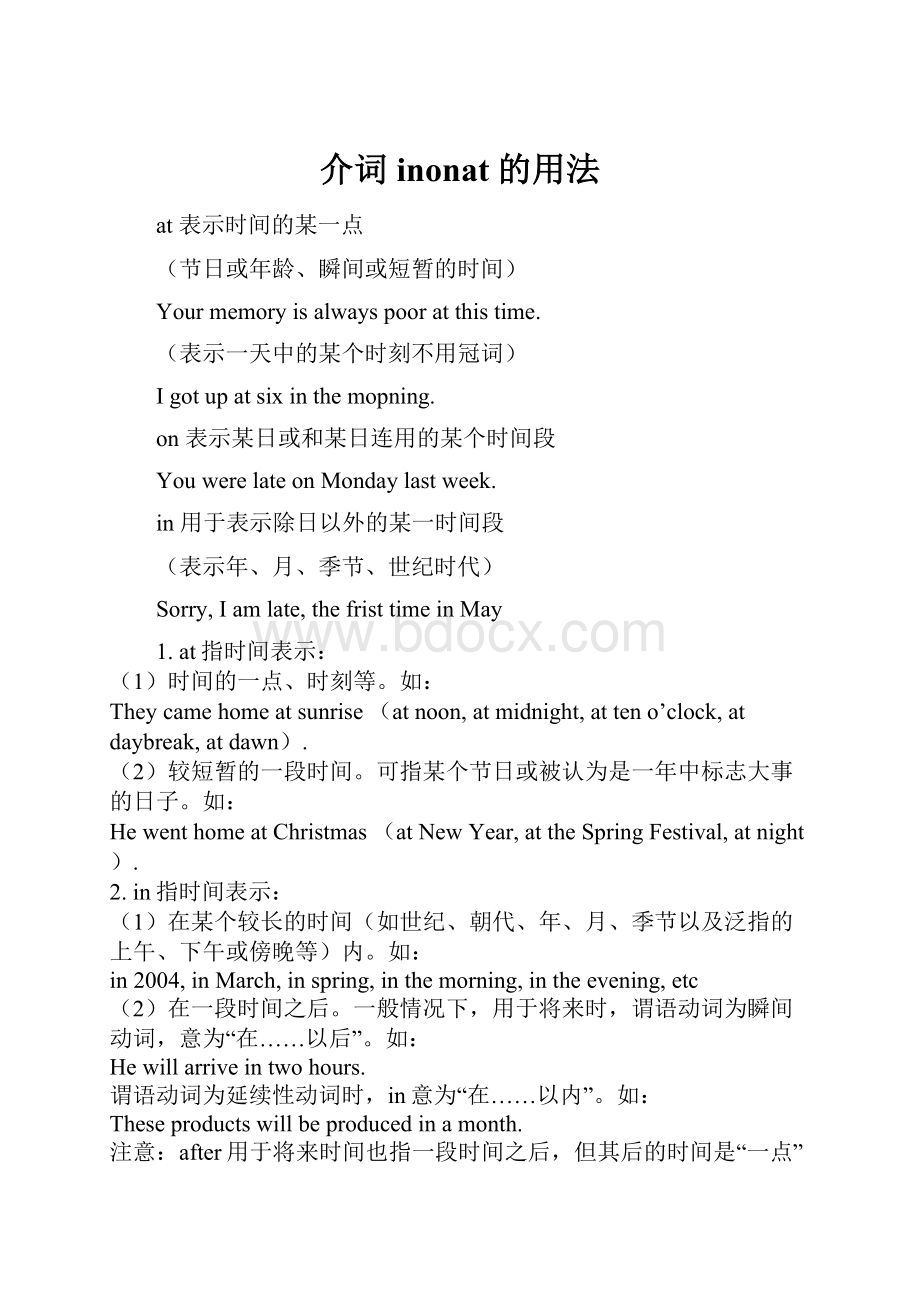介词inonat 的用法.docx
《介词inonat 的用法.docx》由会员分享,可在线阅读,更多相关《介词inonat 的用法.docx(10页珍藏版)》请在冰豆网上搜索。

介词inonat的用法
at表示时间的某一点
(节日或年龄、瞬间或短暂的时间)
Yourmemoryisalwayspooratthistime.
(表示一天中的某个时刻不用冠词)
Igotupatsixinthemopning.
on表示某日或和某日连用的某个时间段
YouwerelateonMondaylastweek.
in用于表示除日以外的某一时间段
(表示年、月、季节、世纪时代)
Sorry,Iamlate,thefristtimeinMay
1.at指时间表示:
(1)时间的一点、时刻等。
如:
Theycamehomeatsunrise(atnoon,atmidnight,atteno’clock,atdaybreak,atdawn).
(2)较短暂的一段时间。
可指某个节日或被认为是一年中标志大事的日子。
如:
HewenthomeatChristmas(atNewYear,attheSpringFestival,atnight).
2.in指时间表示:
(1)在某个较长的时间(如世纪、朝代、年、月、季节以及泛指的上午、下午或傍晚等)内。
如:
in2004,inMarch,inspring,inthemorning,intheevening,etc
(2)在一段时间之后。
一般情况下,用于将来时,谓语动词为瞬间动词,意为“在……以后”。
如:
Hewillarriveintwohours.
谓语动词为延续性动词时,in意为“在……以内”。
如:
Theseproductswillbeproducedinamonth.
注意:
after用于将来时间也指一段时间之后,但其后的时间是“一点”,而不是“一段”。
如:
Hewillarriveaftertwoo’clock.
3.on指时间表示:
(1)具体的时日和一个特定的时间,如某日、某节日、星期几等。
如:
OnChristmasDay(OnMay4th),therewillbeacelebration.
(2)在某个特定的早晨、下午或晚上。
如:
Hearrivedat10o’clockonthenightofthe5th.
(3)准时,按时。
如:
Ifthetrainshouldbeontime,Ishouldreachhomebeforedark.
4.by指时间表示:
(1)不迟于,在(某时)前。
如:
Hewillcomebysixo’clock.
Jackhadmadesomefriendsbythetimeyoucame.
(2)在……间,在……的时候。
如:
Heworkedbydayandsleptbynight.
2.一、1.早、午、晚要用in
inthemorning在早上intheafternoon在下午
intheevening在晚上intheday在白天
2.用于月,年,季节,世纪等.
inspring在春季insummer在夏季
inautumn在秋季inwinter在冬季
in1986在1986年inApril在四月
inDecember1986在1986年12月
inthe21stcentury(21世纪)
inaweek(一周)
inthreedays(weeks/month)三天(周/个月)
二、at的用法
1.at用于固定的钟点.
at7:
30(seventhirty)在7点半athalfpasteleven在11点半atsixo’clock在6点钟
2.用于固定搭配.
atdawn,atdaybreak在黎明时候atnoon在中午atnight在夜间 atmidnight在午夜atfiveo’clock(五点),atdaybreak(天亮),atsunrise(日出),atsunset(日落),atthattime(那时),atthebeginningofthemonth(月初),atthatmoment(那会儿),atthistimeofday(在一天的这个时候)。
三、在阳光下,在灯下,在树阴下,穿衣、着装、冒雨等都要用in。
例:
Don’treadindimlight.切勿在暗淡的灯光下看书
Theyaresittingintheshadeofatree.他们坐在树阴下凉。
Hewentintheraintomeetmeatthestation.
他冒雨到车站去接我。
四、at是小地点,in指大地方,表示的是面,表示的是点.
TheywillarriveinShanghai.他们将到上海.
Theywillarriveattheschool.他们将到学校.
Turnleftatthecinema.在电影院左拐.
Theyliveontheninthfloor.他们住在九楼.
Iwillmeetyouatthebusstop.我在车站接你.
五、on的用法
1.用于具体某一天.Onmybirthday,onJune6,
onSunday,onNewYear’sDay
2.用于描述性的时间.Onacoldnight,onawinterday
onthemorningofthe15th(15日的早上)
介词in,on与at都可用于表示时间的名词前,但用法各不相同,其区别在于:
一、用in的场合
(1)表示“在某年/月/季节”这个含义时,须用介词in。
例如:
Shecametothiscityin1980.他于1980年来到这个城市。
Itoftenrainshereinsummer.夏天这里常常下雨。
(2)表示“从现在起一段时间以后”时,须用介词in。
例如:
Theywillgotoseeyouinaweek.他们将在一周后去看望你。
Iwillbebackinamonth.我将在一个月后回来。
(3)表示“在某世纪”时,须用介词in.例如:
Thismachinewasinventedintheeighteenthcentury.这台机器是在18世纪发明的.Greatchangestookplaceinthetwentiethcentury.20世纪发生了巨大变化.(4)表示“在某年代或特定世纪某年代”时,须用介词in。
例如:
Thisincidenthappenedinthe1970''''s.该事件发生在20世纪70年代。
TheAnti-JapaneseWarbrokeoutinthe1930''''s.抗日战争爆发于20世纪30年代。
除此之外,morning/evening/afternoon三个词也常跟介词in连用。
例如:
Don''''twatchTVtoomuchintheevening.晚上看电视不要太多。
Theysometimesplaygamesintheafternoon.他们有时在下午做游戏。
二、用on的场合
(1)表示“在具体的某一天”或“(在具体的某一天的)早上、中午、晚上”等,须用介词on。
例如:
JackwasbornonMay10th,1982.杰克生于1982年5月10日。
Theyleftonarainymorning.他们是在一个雨天的早上离开的。
HewentbacktoAmericaonasummerafternoon.他于一个夏天的下午返回了美国。
(2)表示“在星期几”或“在星期几的早上、中午、晚上”等,须用介词on。
例如:
Wedon''''tgotoschoolonSaturdayandSunday.我们星期六和星期天不上学。
Whattimedoyougetuponweekdays?
你在平日什么时候起床?
IheardthisstoryonSaturdaymorning.我是在星期六的早晨听到这个故事的。
(3)表示“在某一节日”时,须用介词on。
例如:
WeusuallyeatmooncakesonMid-autumnFestival.我们通常在中秋节吃月饼。
MrHureceivedacardonTeachers''''Day.胡老师在教师节那天收到了一张卡片。
注意:
当morning,evening,afternoon被of短语修饰,习惯上用in,而不用on.例如:
intheearlymorningofSeptember10th在9月10的清晨;inthelateafternoonofSeptember12th在9月12日的傍晚。
三、用at的场合
(1)表示“某一具体时刻(即几点几分时)”,须用介词at。
例如:
Hegetsupatsixo''''clockeveryday.他每天六点起床。
Igothomeatfivethirtyyesterdayafternoon.我昨天下午五点半到家。
(2)用在特定的时候(时节、时机)时,须用介词at。
例如:
Theywerehappyatthattime.他们那时很幸福。
Ithinktheshopisclcsedatthistimelfday.我认为商店在白天的这个时候关门了。
(3)表示“在中午、在夜晚、在周末”时,须用介词at。
例如:
Whatdoyouoftendoatnoon?
你中午经常做些什么?
Youcanseemanystarsintheskyatnight.夜晚你能看到天空中有许多星星。
(4)表示“在……岁”时,须用介词at。
例如:
Attheageofnine,theboycouldswimwell.在九岁的时候,这孩子就游泳游得很好了。
Attheageoftwenty,IbegantoteachEnglishatthisschool.在二十岁的时候,我就开始在这所学校教英语了。
3.答案补充
4.注意:
在含有next,last,this,one,any,each,every,some,all的词组和tomorrow,yesterday,thedaybeforeyesterday前不用任何介词。
例如:
Whatdidyoudolastsummerholidays?
去年暑假你做了些什么?
Whatareyougoingtodothedayaftertomorrow?
后天你打算做什么?
TOINON这三个词在位置里的区别in表示"在……范围内”,还表示“在…之中”。
比如:
HaikouliesinthesouthofChinaon表示“与……毗邻,接壤”,还有表示“在……之上”强调和表面接触,比如:
CanadaliesonthenorthofAmericato表示方位,不接壤。
比如:
HaikouliestothesouthofGuangzhouin从属关系,一个城市属于一个城市(多指国家)on相邻关系,一个城市在另一个城市旁边to是隔海相望的.
介词at,in,on,by表示地方、地点、位置:
2.1at把地方、地点、位置当作一个“点”:
1.Thebeggerissittingatthecorner.那乞丐坐在角落里
2.Janeiswaitingforyouatthebusstop.Jane在巴士站等你。
3.athome在家
4.Who'sstandingthereatthedoor?
谁站在门口?
5.atthetopofthepage在一页的上面
6.Theshopisattheendoftheroad.那商店就在路的尾端。
7.attheentrance在进口处
8.atthecrossroads在十字路口
9.Whenwillyouarriveattheoffice?
你什么时候会到公司呢?
10.I'minFrance,atParis.我住在法国巴黎。
(相对法国来讲,巴黎只是一个
“点”)
11.Thereisasmallhutatthefootofthehill.山脚下有一座小屋子。
12.Myauntlivesat55BoretzRoadinDurham.
我的姑妈住在Durham,Boretz路门牌55号。
(地址要用at,不能用in)
13.attheside在一边
14.atreception在招待会上
15.I'matwork.我在工作。
16.atclass/home/thelibrary/theoffice/school在班上/家里/图书馆/公
司/学校
2.2in把地方、地点、位置当作一个范围或一个封闭的空间:
1.IliveinLondon.我住在伦敦。
(大城市用in)
2.IliveinEngland,atLondon.我住在英国伦敦。
(England大过London喔)
3.Iliveinabigcity,mysisterlivesatasmalltown.我住在大城市,我
姐姐住在一个小市镇。
(如果把city看做一个圆圈,smalltown就成一个点。
因此就in
acity,atasmalltown.呵呵)
4.WehaveameetinginBeijing.我们有北京有一个会议。
5.MarsisintheSolarSystem.火星在太阳系里。
6.inacar乘汽车(不是onacar也不是byacar喔)
7.inataxi乘的士(不是onataxi或byataxi)
8.inahelicopter乘直升机
9.inaboat乘小船
10.inalift(elevator)乘电梯(电梯像个笼子,当然要用in啦)
11.inthenewspaper在报上
12.inthesky在空中
13.inthebed在床上(也可用onthebed)
14.inthebedroom/class/library/school在寝室/课室/图书馆/学校
2.3on把地方、地点、位置当作一个平面:
1.Theauthor'snameisonthecoverofthebook.在书的封面上有作者的名
字。
2.Therearenopricesonthismenu.在这菜单上没有价钱。
3.Youarestandingonmyfoot.你踏到我的脚了。
4.Therewasa"nosmoking"signonthewall.在那墙上有个“不准吸烟”的牌
子。
5.Iliveonthe7thfloorat21OxfordStreetinLondon.我住在伦敦牛津街
21号八楼。
(7thfloor就是八楼;注意句中的on,at,in的用法)
6.onabus乘巴士(不是inabus喔)
7.onatrain乘火车(可想像“骑”在火车上,哈哈)
8.onaplane乘飞机(可想像“骑”在飞机上)
9.onaship乘轮船
10.onabicycle,onamotorbike骑自行车/摩托车
11.onahorse,onanelephant骑马/象
12.ontheradio,ontelevision听广播、看电视
13.ontheleft,ontheright在左边、在右边
14.ontheway在路上
15.onthebed在床上(也可用inthebed)
16.ontheceiling在天花板上
17.onthefloor在地板上
2.4by用在表示位置(有在旁、贴近、靠近之意):
1.bythefire在炉边
2.bytheseaside在海边
3.apathbytheriver沿河道路
4.bythenearestroad走近路
我想要记忆介词的用法,就得用一点想象力加以联想。
如:
athome,atthedoor,at
thecorner等等,可想象“at家门口的角落里”。
再比如:
inBeijing,inacar,in
ataxi,inaboat,inahelicopter,inthesky...可想象为“In北京,乘汽
5.车,乘的士,再乘小船,乘上直升机在空中飞”。
6.on,at,in这三个常用介词都可以表示时间和地点,但具体用法不同,多数学生对它们混淆不清。
现在只要记住了口诀,就可避免at,on,in的种种误用。
7.
8.1.on,in,at表示时间
9.
10.on“在具体某一天”①
11.
12.“当某时”,动名词,arrival,death前;early,late位句先②,用in一般“上”“下”“晚”;on用于天,in用于月、季、年③;限定三时in要变。
④at是个时间点,“工作”“时刻”与“圣诞”⑤。
atnoon(night),intheday,习惯用语记心间。
13.
14.注:
①on表示在具体某一天及具体某一天的上午、下午和晚上。
15.
16.例Onmother'sDay,weshouldsendflowerstoourmother.母亲节,我们应该送花给我们的母亲。
17.
18.Onmyarrivalhome,Ifoundhehadgonealready.当我到家时,我发现他已经走了。
19.
20.②当early,late用于句首修饰介词短语时,尽管表示具体某一天的上午、下午、晚上,都要用in,泛指一般的上、下午,晚上也用in。
21.
22.例EarlyinthemorningofNationalDay,Igotuptocatchthefirstbustothezoo.国庆节一清早,我便起床去赶到动物园的第一班公共汽车。
23.
24.Myfatherbeginsworkat8:
00inthemorningandstopsworkat4:
00intheafternoon.我父亲上午8点上班,下午4点下班。
25.
26.③于将来时态表示“过一段时间后”及表示“在……期间”和“在某个季节,某年、某月”都用in。
27.
28.例Ihearhe’llbebackinamonth.我听说他将于一个月后回来。
29.
30.
31.InthecourseofthelastlessoninFrench,littleFranzwaslisteningtothemasterveryattentively.在那最后一堂法语课中,小弗朗兹非常用心地听着老师讲。
32.
33.XiaoMingwasborninDecemberof2004.小明生于2004年12月。
34.
35.④当morning,afternoon,evening有前位定语或后置定语限定时,就不用in而用on。
36.
37.例onahot(summer)noon在一个炎热(夏天)的中午
38.
39.onMondaymorning在星期一上午
40.onthemorningofMarch8th在3月8日上午
41.
42.⑤表示某时某刻及在work,Christmas前用at。
43.
44.例Wegetupateighto’clock.我们8点起床。
45.Myfatherarebusilyatworkallday.我父亲整天忙于工作。
46.
47.InwesterncountrieschildrengetpresentfromtheirparentsatChristmas.在西方国家,孩子们在圣诞节得到父亲给的礼物。
48.
49.希望可以帮到你~
50.有什么问题,你可以XXHI我~